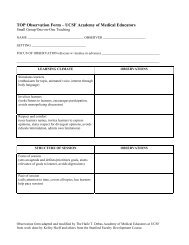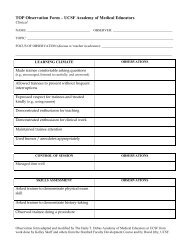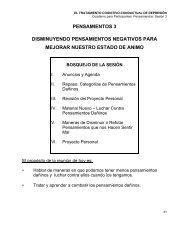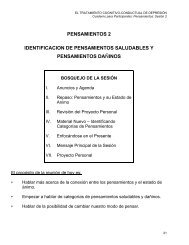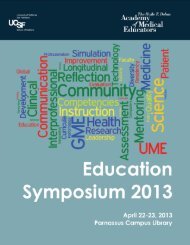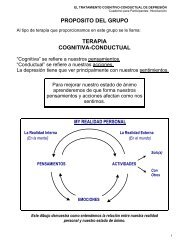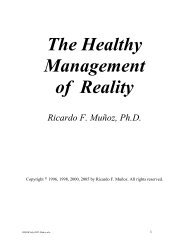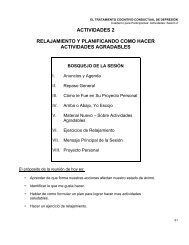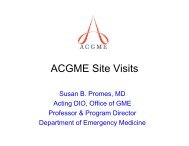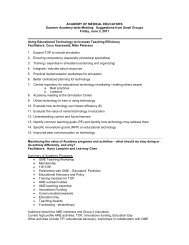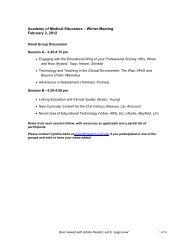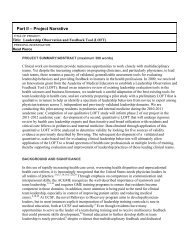2011 - UCSF School of Medicine - University of California, San ...
2011 - UCSF School of Medicine - University of California, San ...
2011 - UCSF School of Medicine - University of California, San ...
You also want an ePaper? Increase the reach of your titles
YUMPU automatically turns print PDFs into web optimized ePapers that Google loves.
<strong>UCSF</strong> Education Day <strong>2011</strong>interventions and outcome measurements impedesidentification <strong>of</strong> the most effective teaching methods.Higher quality studies <strong>of</strong> PE teaching, particularly in therealm <strong>of</strong> synthesis, will allow for better identification <strong>of</strong>best practices in this area.Reflective critique: Based on recommendations fromESCape, we will add statistical expertise to the project toassess effect sizes.Pilot <strong>of</strong> a Lifelong Pr<strong>of</strong>essionalDevelopment Metric in a ScholarlyConcentration ProgramRenee Courey, PhD, <strong>UCSF</strong>, renee.courey@ucsf.edu;Carrie Chen, MD, MSEd, <strong>UCSF</strong>,chenhc@peds.ucsf.edu; Louise Aronson, MD, MA,<strong>UCSF</strong>, aronsonl@medicine.ucsf.edu; Kristen Fitzhenry,MS, <strong>UCSF</strong>, FitzhenryK@medsch.ucsf.edu; Josh Adler,MD, <strong>UCSF</strong>, aadlerj@ucsfmedcenter.org; AdditionalPathway to Discovery Directors, <strong>UCSF</strong>Areas abstract covers: UME, GME, IPHEDomain(s) addressed: Competencies, Evaluation <strong>of</strong>Programs and Curricula, Longitudinal EducationalActivities, MentoringPurpose: To design and pilot an assessment tool thatdescribes progress in skills acquisition for scholarshipand leadership careers.Background: The <strong>UCSF</strong> Pathways to Discoveryprogram prepares interpr<strong>of</strong>essional UME and GMEtrainees in discovery and leadership. Learners completeformal curricula and faculty-mentored projects in areasranging from the molecular to the global. Traditionally,assessment measured only course participation, projectquality, presentations, publications, and learnersatisfaction. Because the program aims to launchcareers in innovation, academia and leadership, ameans <strong>of</strong> charting steps along the continuum <strong>of</strong>pr<strong>of</strong>essional development was also required.Methods: We adapted the Dreyfus scale <strong>of</strong> skillacquisition from novice to expert to measure progress inthree competency areas, “Research and Scholarship,”Leadership and Advocacy,” and “Pr<strong>of</strong>essional IdentityDevelopment.” The scale was sent to 52 faculty mentorsand did not allow selection <strong>of</strong> expert.Results: 33/52 faculty mentors responded. For the threecompetency areas, 52%, 64%, and 67%, respectively,placed their mentees at pr<strong>of</strong>icient, the highest availablelevel, describing competency usually achieved at theassistant pr<strong>of</strong>essor stage.Discussion: The number <strong>of</strong> mentors selecting thehighest level <strong>of</strong> achievement greatly exceededexpectations. Program leaders anticipated that mostUME learners would move from novice or beginner tobeginner or competent. The failure to capture accuratedata on the stage <strong>of</strong> learners’ pr<strong>of</strong>essional developmentmay be due to the culture <strong>of</strong> grading. Mentor educationand explicit distinction <strong>of</strong> formative career progressionassessment from summative performance assessmentmay improve appropriate scale use by mentors.Reflective critique: The results <strong>of</strong> the pilot evaluationhave been presented to the Committee on Curriculumand Educational Policy (CCEP). The Pathways toDiscovery Directors have also reviewed this data.Pr<strong>of</strong>essional Deformation: TheRepression <strong>of</strong> Personal Values andAttributes in Medical EducationMichael W. Rabow, MD, <strong>UCSF</strong>,mrabow@medicine.ucsf.edu; Carrie N. Evans, MA,<strong>UCSF</strong>, Carrie.Evans@ucsf.edu; Rachel N. Remen, MD,<strong>UCSF</strong>, drrachel@commonweal.orgAreas abstract covers: UMEDomain(s) addressed: Medical Humanities,Pr<strong>of</strong>essionalism, Reflection, ResearchPurpose: To understand what personal qualities orvalues students believe they might lose or be forced tosurrender during the course <strong>of</strong> their medical education.Background: The process <strong>of</strong> developing character andcommitment to the highest values <strong>of</strong> medicine has beencalled “pr<strong>of</strong>essional formation" (1). However, medicalstudents are at risk for “deformation” as well. Asstudents progress through medical school, they gainpr<strong>of</strong>essional competence but may also be at risk forharm. Prior research has documented the development<strong>of</strong> depression and the loss <strong>of</strong> empathy during medicaltraining. Little research has examined students’ ownexperience <strong>of</strong> such changes.Methods: In 2007-08, Healer’s Art elective studentsinternationally submitted words that described a part <strong>of</strong>themselves that they were wary about showing oractually did not let show in school. These words wereanalyzed using qualitative and quantitative techniques.Results: Words from 673 medical students from 31medical schools were analyzed. Eleven themes wereidentified. The most common themes were Spirituality,Emotional Engagement, Identity/Self-expression,Freedom/Spontaneity, and Relationships. The mostcommon individual words used were “Creativity,”“Family,” “Balance,” “Freedom,” “Love,” and “Peace.”38 The Haile T. Debas Academy <strong>of</strong> Medical Educators



